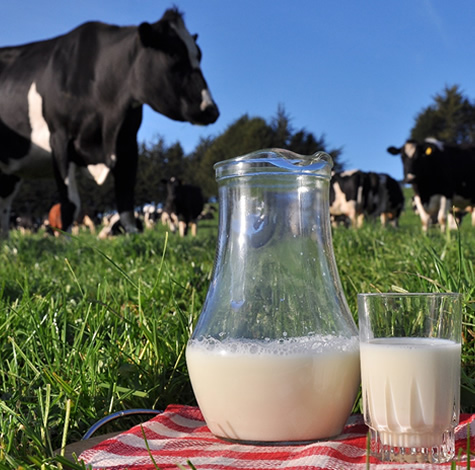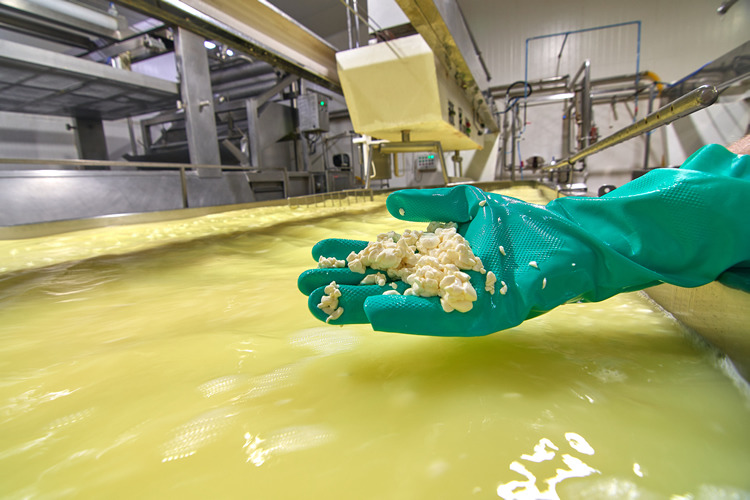Beautiful meadows and healthy crops
Atributos de la leche
Milk Atributtes
The production and consumption of cow's milk are of paramount importance in the national economy and in much of the world. It is a relevant component in people's diets, especially for its high-value nutrient content that contributes to a proper diet, especially in childhood.
Milk and dairy products are carbohydrate-rich foods that provide energy and have significant amounts of protein, fat and micronutrients, essential to reduce malnutrition, especially among the most vulnerable.
Doctors and nutritionists emphasize the need to consume dairy products, since they are the main source of calcium, vitamin A, group B (B1 and B12) D, potassium, magnesium, iodine and other essential nutrients for good bone health and the prevention of diseases such as osteoporosis and possible bone problems, fractures, etc. For this reason, it is necessary to incorporate three portions of dairy products into the daily diet. The good thing about dairy products is that they can be consumed and combined in several different ways, alone or accompanied. It is Your choice!



Beneficios de la Leche
Milk benefits
A glass of milk (200 ml) provides approximately 30% of the recommended daily dose of calcium, an element that helps form and maintain strong bones and teeth, in addition to its role in nerve function, muscle contraction and maintenance of normal blood pressure.
This amount also provides a significant percentage of the daily recommendations for other fundamental minerals such as potassium (11%), necessary for muscle tone and contraction; phosphorus (20%), a nutrient that helps strengthen bones and generates energy in the body's cells. This amount also provides about 15% of the daily protein requirement of high biological value, a nutrient necessary for the formation of cell structure.
It also provides the body with vitamin D, vitamin A, vitamin B12 and other B vitamins (B2 and Niacin), iodine, zinc, magnesium and other micronutrients.
Milk is involved in the prevention of dental and oral conditions, helps to fall asleep, is important in hydration and participates in the prevention of chronic non-communicable diseases (diabetes, hypertension, cardiovascular disorders).
The recommendation of an intake of at least three servings of dairy products per day has been established, being of special importance the incorporation of the habit of consuming milk and dairy products in children (after breastfeeding), to obtain the benefits that This food offers, in addition to creating the habit of healthy eating for the rest of their lives and that will be transmitted from generation to generation.
For our body, milk is a fundamental part of the daily diet as it provides invaluable nutrients for the growth and development of people, some such as:
• Proteins of high biological value: which are essential for proper development of the body and intelligence. They strengthen and regenerate muscles and tissues throughout the body.
• Natural source of calcium: this is a necessary mineral for the development of bones, teeth, ligaments, among other parts of the body. To supply the necessary amount of this nutrient, three dairy products should be taken a day.
• Rich supply of vitamins: either A, D, E, K or B vitamins, which help strengthen the body's defenses. milk provides necessary vitamins in all stages of life, being the main source in food.
• Nutritional contribution of minerals: with a high content of mineral elements such as zinc, magnesium, potassium, phosphorus that make up an incomparable package of macronutrients (carbohydrates, proteins and lipids) and micronutrients (vitamins and minerals) essential for proper growth and development in the childhood, milk.
In addition to contributing to a healthy and balanced diet, milk has important properties that make it one of the best and most complete foods that nature has given us and which allows us to:
– Maintain an adequate weight: several studies indicate that drinking low-fat milk helps to lose weight and eat a healthy diet.
– Stay hydrated: it is recommended for good general health. Drink low-fat milk, which provides the necessary proteins to recover muscle wear, after physical exertion.
– Good dental health: milk plays a fundamental role in dental health, according to several clinical studies. In addition, it reduces the cariogenic effect (which produces cavities) of certain foods.
– Helps cardiovascular health: similarly, the consumption of dairy products has shown a decrease in the risk of heart attack, mostly in women. Apparently, the benefit would be in the type of fatty acids that milk contains.
Propiedades de la Leche
Product properties
a) Proteins: Dairy products provide proteins of high digestibility and high biological value, since they provide the necessary amino acids to cover human requirements. They have a balanced composition of amino acids, especially essential amino acids. Highlights the high content of branched chain amino acids (leucine, isoleucine and valine) and especially lysine. Thus, after egg protein, milk protein has the second highest biological value, its values ranging between 80-90%. Due to their high lysine content, they can raise the biological value of lower value proteins such as cereals, when consumed together.
b) Lipids: milk contains around 3.6 grams of fat per 100 ml, which represents around 50% of the energy value of the product. Milk fat contains significant amounts of short and medium chain fatty acids, which facilitates its digestibility. However, it has a high content of saturated fatty acids (myristic, palmitic and stearic), reaching two thirds of the total fatty acids.
c) Carbohydrates: lactose is the main and almost exclusive carbohydrate in milk. It has an essentially energetic function. It is hydrolyzed in the intestine into its two components: glucose and galactose. The latter, in addition to being an energy source, is used by the body for the synthesis of glycolipids (cerebrosides play a fundamental role in the development of the newborn) and glycoproteins. The lactose present in milk seems to have a beneficial effect on the intestinal absorption of calcium. Among other mechanisms of action, it has been postulated that lactose increases calcium transport through the non-saturable paracellular pathway, specifically because by increasing the volume of distal intestinal fluid, it increases the intercellular space and, therefore, permeability. In adults, this effect seems to be more relevant in situations of compromised calcium absorption”.
d) Minerals: dairy products are an excellent source of minerals (they make up around 1% of its composition), especially calcium, but also phosphorus, zinc, sodium and potassium. The contribution of iodine, selenium and chromium is also important. But among all of them, its calcium content stands out, to the point that it makes milk (and its derivatives) the main source of this mineral, essential for life.





